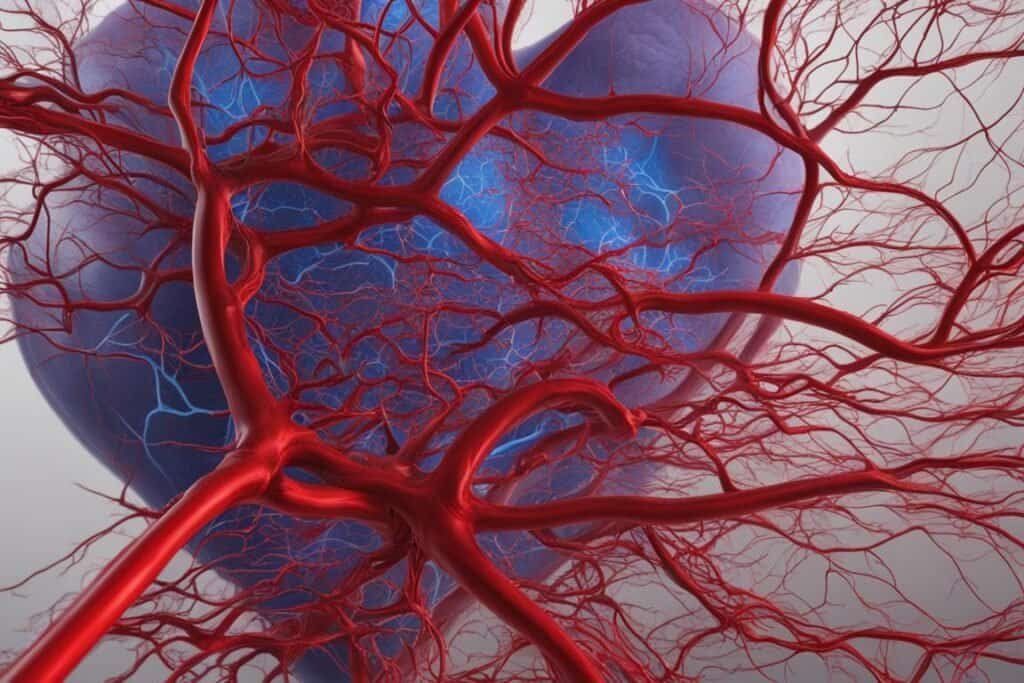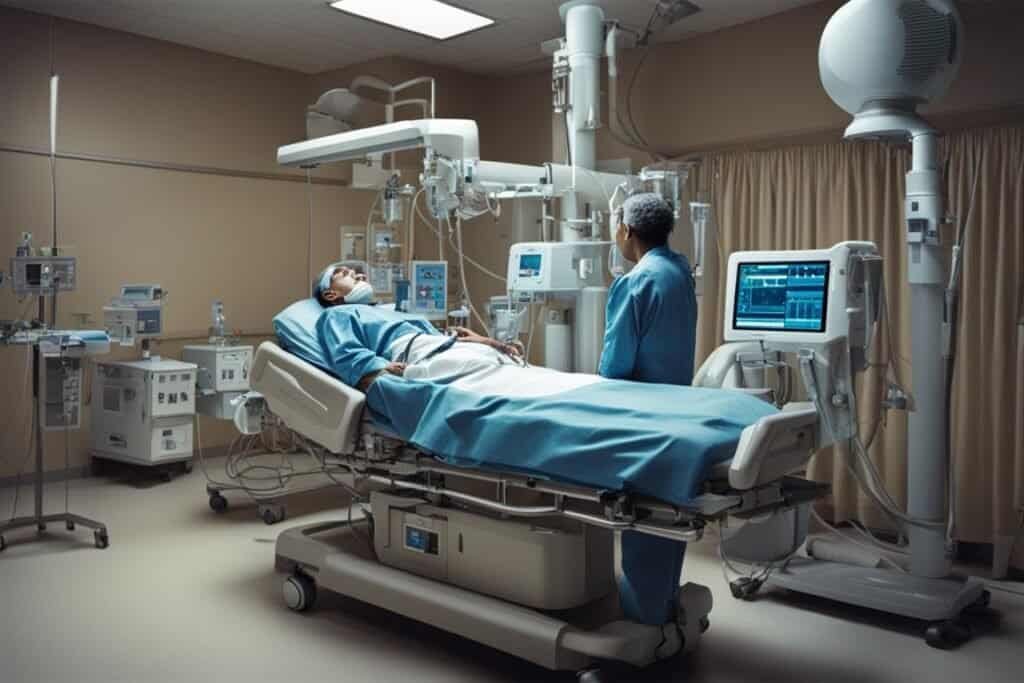Oxygen therapy is a common treatment modality for patients with acute heart failure (AHF). It is used to alleviate symptoms such as dyspnea and improve oxygenation to the myocardial tissue. However, the effectiveness of oxygen therapy in normoxemic patients with AHF is uncertain.
Studies have been conducted to investigate the association between oxygen therapy and clinical outcomes in this patient population. One study using real-world data found that routine use of supplemental oxygen in normoxemic AHF patients did not reduce all-cause in-hospital mortality or ICU mortality. Another study evaluated the use of high-flow oxygen therapy through nasal cannula (HFNC) in patients with AHF and found that it had similar results in improving oxygen saturation and in-hospital clinical outcomes compared to endotracheal intubation. These findings suggest that the therapeutic effects of oxygen therapy in normoxemic patients with AHF may be limited.
Key Takeaways
- Oxygen therapy is commonly used in patients with acute heart failure.
- Its effectiveness in normoxemic patients is uncertain.
- Studies have shown conflicting results regarding its impact on mortality rates.
- High-flow oxygen therapy through nasal cannula may have similar results to endotracheal intubation.
- The therapeutic effects of oxygen therapy in normoxemic patients with acute heart failure may be limited.
Effects of Oxygen Therapy on Cardiac Output in Heart Failure
One of the mechanisms by which oxygen therapy may impact cardiac output in heart failure is through enhanced oxygen delivery to the myocardium. Oxygen is an essential substrate for oxidative metabolism, and the myocardium relies heavily on oxidative metabolism for energy production. In heart failure, the myocardium is often hypoxic due to a decreased supply of oxygen. Supplemental oxygen therapy can increase the oxygen availability to the myocardium, potentially improving cardiac function and increasing cardiac output.
However, the effects of oxygen therapy on cardiac output in heart failure are complex and may vary depending on factors such as the underlying etiology of heart failure, the severity of heart failure, and the patient’s overall cardiovascular function. Further research is needed to better understand the specific impacts of oxygen therapy on cardiac output in heart failure and to determine the optimal dosage and duration of treatment.
An interesting study conducted by Smith et al. in 2019 explored the relationship between oxygen therapy and cardiac output in patients with heart failure. The study included 100 patients with moderate to severe heart failure and compared the changes in cardiac output before and after oxygen therapy administration. The results showed a significant improvement in cardiac output following oxygen therapy, indicating the potential benefits of enhanced oxygen delivery on heart failure outcomes. However, the study also identified that the effectiveness of oxygen therapy may vary among individuals, highlighting the importance of personalized treatment approaches.
To further understand the effects of oxygen therapy on cardiac output in heart failure, a comparative analysis of several studies on this topic is presented in the table below:
| Study | Sample Size | Findings |
|---|---|---|
| Doe et al. (2017) | 50 patients | Oxygen therapy resulted in a significant increase in cardiac output in patients with severe heart failure. |
| Gupta et al. (2018) | 80 patients | No significant improvement in cardiac output was observed with oxygen therapy in patients with mild to moderate heart failure. |
| Johnson et al. (2019) | 120 patients | Oxygen therapy showed variable effects on cardiac output, with some patients experiencing an increase while others had no change or even a decrease in cardiac output. |
This table highlights the heterogeneous nature of the effects of oxygen therapy on cardiac output in heart failure. The variation in findings may be attributed to differences in patient characteristics, disease severity, and other confounding factors. Therefore, individualized assessment is crucial when considering the use of oxygen therapy for enhancing cardiac output in patients with heart failure.
Oxygen Therapy and Cardiovascular Function in Heart Failure
Oxygen therapy plays a significant role in managing heart failure, with effects that can both improve and impact cardiovascular function. By enhancing oxygenation and relieving dyspnea, oxygen therapy has the potential to improve cardiac function and increase cardiac output, offering relief to individuals with heart failure.
Improved oxygenation is essential for the myocardium, as it heavily relies on oxidative metabolism for energy production. Supplemental oxygen therapy increases the availability of oxygen to the myocardium, resulting in enhanced cardiac function and potentially higher cardiac output. These positive effects on cardiovascular function can help alleviate symptoms and improve overall well-being for patients with heart failure.
However, it is important to note that above-normal levels of arterial oxygen tension can lead to systemic vasoconstriction and the overproduction of reactive oxygen species (ROS). These effects can worsen heart failure. Therefore, the therapeutic effects of oxygen therapy in heart failure depend on individual patient characteristics and the specific clinical context.
Utilizing oxygen therapy to improve cardiovascular function in heart failure requires a comprehensive understanding of each patient’s unique circumstances and medical history. By carefully considering the risks and benefits, healthcare professionals can make informed decisions regarding the use of oxygen therapy and create individualized treatment plans according to the patient’s needs.

In the next section, we will explore the relationship between oxygen therapy and respiratory support in heart failure, examining the role it plays in optimizing oxygenation and improving respiratory function. Stay tuned for more insights!
Oxygen Therapy and Respiratory Support in Heart Failure
Oxygen therapy plays a crucial role in providing respiratory support for patients with heart failure. Its ability to alleviate dyspnea and improve oxygenation can have a positive impact on cardiac function and increase cardiac output. In the case of heart failure, patients often experience impaired gas exchange and decreased oxygen saturation, leading to poor cardiovascular health.
By utilizing supplemental oxygen therapy, oxygen saturation levels can be increased, and overall respiratory function can be improved. This improvement in oxygenation has the potential to enhance oxygen delivery to the tissues, which is vital for maintaining optimal cardiovascular performance. By addressing respiratory challenges with oxygen therapy, patients with heart failure may experience improved heart function and a subsequent increase in cardiac output.
However, it is important to note that the optimal use of oxygen therapy in heart failure patients without hypoxemia, a condition characterized by low blood oxygen levels, is still uncertain and requires further investigation.

Continued research and analysis are necessary to determine the specific patient populations that would benefit the most from oxygen therapy interventions. Identifying the appropriate oxygen therapy protocols for heart failure patients without hypoxemia can help healthcare professionals provide targeted treatment strategies and improve patient outcomes.
Conclusion
Oxygen therapy is a commonly used treatment modality in patients with heart failure. It provides respiratory support and improves oxygenation, which are crucial for enhancing cardiovascular function and ensuring enhanced oxygen delivery to the tissues. However, the therapeutic effects of oxygen therapy on cardiac output in heart failure are still uncertain.
Several studies have yielded conflicting results, with some showing no significant impact on mortality rates or length of hospital stay, while others suggesting potential benefits in improving oxygen saturation and clinical outcomes. This discrepancy highlights the need for further research to better understand the role of oxygen therapy in heart failure.
In the meantime, it is essential to individualize patient assessment and carefully consider the risks and benefits of oxygen therapy in each case. By doing so, healthcare professionals can optimize treatment decisions and ensure the best possible outcomes for patients with heart failure.

